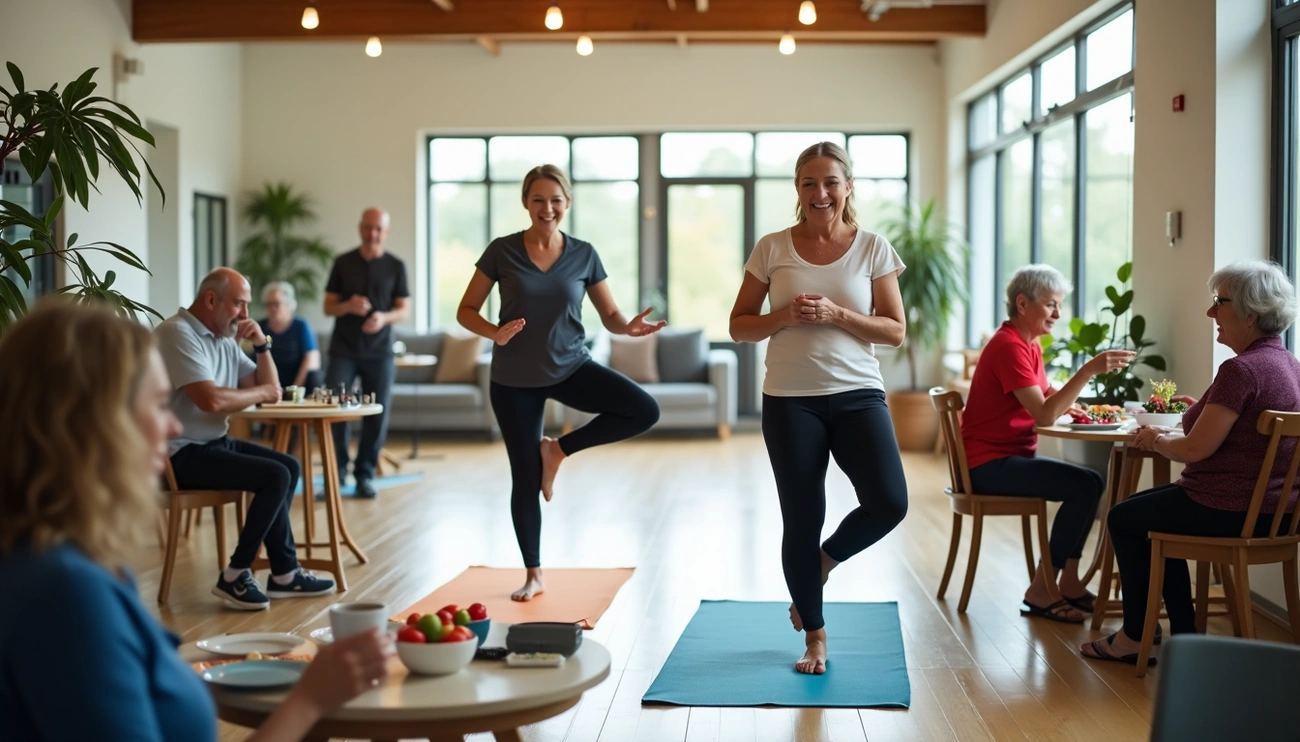Enhancing Daily Life and Independence
As we age, maintaining our ability to perform everyday tasks becomes increasingly important for preserving independence and quality of life. Enter functional fitness training – a revolutionary approach to exercise that’s gaining popularity, especially among seniors. This article explores the benefits, challenges, and practical aspects of functional fitness for older adults, providing valuable insights for those looking to enhance their physical capabilities and overall well-being.
What is Functional Fitness?
Functional fitness is a type of exercise that focuses on training your body to handle real-life situations. Unlike traditional workouts that might isolate specific muscle groups, functional fitness involves exercises that simulate common daily activities. This approach is particularly beneficial for seniors, as it directly improves their ability to perform everyday tasks with greater ease and confidence.
Dr. Emily Chen, a geriatric specialist at the National Institute on Aging, explains, “Functional fitness is about preparing the body for real-life movements. It’s not just about building muscle or endurance; it’s about enhancing the quality of life by making daily activities easier and safer.”
The Growing Popularity of Functional Fitness Among Seniors
Recent trends show a significant uptick in the adoption of functional fitness programs among older adults. According to a 2025 market analysis, the global functional fitness equipment market is projected to reach USD 15.50 billion by 2031, growing at a compound annual growth rate (CAGR) of 11.3% from 2024 to 2031 [1]. This growth is largely attributed to an increasing awareness of the benefits of functional fitness, especially for the aging population.
Key Benefits of Functional Fitness for Seniors
- Improved Mobility and Balance: Functional exercises often involve multi-joint movements that enhance overall mobility and balance, crucial for preventing falls in older adults.
- Enhanced Strength for Daily Tasks: By mimicking everyday movements, functional fitness builds strength that directly translates to daily activities like carrying groceries or climbing stairs.
- Better Coordination: Many functional exercises require coordination between different body parts, helping seniors maintain and improve their motor skills.
- Increased Independence: As functional fitness improves physical capabilities, seniors can maintain their independence longer, performing daily tasks without assistance.
- Reduced Risk of Injury: By strengthening the muscles used in everyday activities, functional fitness can help reduce the risk of injuries from daily tasks.
Expert Opinions and Statistics
Dr. Robert Lee, a researcher specializing in gerontology, notes, “Our studies have shown that seniors who engage in regular functional fitness training experience a 67% improvement in their ability to perform daily activities independently compared to those who don’t exercise at all.”
A comprehensive study published in the Journal of Aging and Physical Activity found that after a 12-week functional fitness program:
- 81% of participants reported improved mobility
- 73% noted increased strength in performing daily tasks
- 65% experienced better balance and reduced fear of falling [2]
Practical Tips for Incorporating Functional Fitness
- Start with Basic Movements: Begin with simple exercises that mimic daily activities, such as sit-to-stand movements or step-ups.
- Use Household Items: Incorporate everyday objects like water bottles or chairs into your routine instead of specialized equipment.
- Focus on Multi-Joint Exercises: Prioritize exercises that work multiple muscle groups simultaneously, such as squats or lunges.
- Gradually Increase Intensity: Start with low-intensity exercises and progressively increase the difficulty as your strength and confidence grow.
- Incorporate Balance Training: Include exercises that challenge your balance, such as single-leg stands or heel-to-toe walks.
Overcoming Challenges in Functional Fitness Training
While functional fitness offers numerous benefits, seniors may face certain challenges when starting a new exercise routine:
- Fear of Injury: Many seniors worry about getting hurt during exercise. Start with gentle movements and consider working with a certified fitness instructor who specializes in senior fitness.
- Limited Mobility: Some seniors may have existing mobility issues. Modify exercises as needed and focus on gradual improvement rather than immediate results.
- Lack of Motivation: Staying motivated can be challenging. Join group classes or find a workout buddy to make exercising more enjoyable and social.
- Underlying Health Conditions: Always consult with a healthcare provider before starting any new exercise program, especially if you have existing health conditions.
Success Stories: Functional Fitness in Action
Mary Thompson, 72, shares her experience: “I started functional fitness training six months ago, and the difference is remarkable. I can now carry my groceries and play with my grandchildren without feeling exhausted. It’s given me a new lease on life!”
Conclusion: Embracing Functional Fitness for a Better Quality of Life
Functional fitness training offers a practical, effective way for seniors to enhance their physical capabilities and maintain independence. By focusing on exercises that mimic daily activities, older adults can improve their strength, balance, and overall mobility, leading to a higher quality of life and reduced risk of injury.
As Dr. Chen concludes, “Functional fitness isn’t just about exercise; it’s about empowering seniors to live life to the fullest. It’s never too late to start, and the benefits are truly life-changing.”
Remember, before starting any new exercise program, it’s essential to consult with a healthcare provider, especially if you have existing health conditions. With the right approach and guidance, functional fitness can be a safe, enjoyable, and highly beneficial addition to any senior’s lifestyle.












